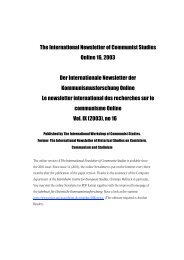VOL. XVI (2010), NO 23 - The International Newsletter of Communist ...
VOL. XVI (2010), NO 23 - The International Newsletter of Communist ...
VOL. XVI (2010), NO 23 - The International Newsletter of Communist ...
Sie wollen auch ein ePaper? Erhöhen Sie die Reichweite Ihrer Titel.
YUMPU macht aus Druck-PDFs automatisch weboptimierte ePaper, die Google liebt.
<strong>The</strong> <strong>International</strong> <strong>Newsletter</strong> <strong>of</strong> <strong>Communist</strong> Studies Online <strong>XVI</strong> (<strong>2010</strong>), no. <strong>23</strong> 34<br />
reflect differently about the high level <strong>of</strong> violence inside the Kremlin Circle, as well as to<br />
provide a fresh look on the personality cult <strong>of</strong> Stalin.<br />
Owing to the fact that filing was a well-implanted habit amongst the Soviet rulers, historians<br />
have an important mass <strong>of</strong> ego-documents available, in spite <strong>of</strong> possible “omissions”,<br />
“selections” or “cleansing operations” on the part <strong>of</strong> these rulers. Most <strong>of</strong> the archival<br />
materials are located in the Russian State Archive <strong>of</strong> Social and Political History (RGASPI) in<br />
Moscow and are comprised <strong>of</strong> personal fonds <strong>of</strong> the leaders. <strong>The</strong> corpus consists <strong>of</strong> five<br />
categories: 1. Correspondence between the different historical protagonists. This is an<br />
essential part, since they were the privileged means <strong>of</strong> communication, especially in the<br />
1930’s. 2. <strong>The</strong> dnevniki (personal diaries). 3. Statements <strong>of</strong> self-criticism (samokritika) and<br />
autobiographies (ankety, avtobiografii). 4. <strong>The</strong> memoirs <strong>of</strong> some <strong>of</strong> the members <strong>of</strong> the<br />
Circle. 5. <strong>The</strong> zapiski, which are short informal notes written during various meetings.<br />
More specifically from a gendered point <strong>of</strong> view, in my research four moments <strong>of</strong> exclusions<br />
are particularly enlightening. <strong>The</strong> first one concerns the arrest, conviction and execution <strong>of</strong><br />
Nikolai Bukharin (1888-1938), star defendant <strong>of</strong> the Third Moscow Trial. <strong>The</strong> analysis <strong>of</strong> this<br />
affair leads to the reconstruction <strong>of</strong> relationships within the Kremlin Circle, as an arch<br />
homosocial group, and to understand the building <strong>of</strong> masculine friendships within the group.<br />
<strong>The</strong> second affair deals with the downfall, arrest, trial and execution <strong>of</strong> Nikolai Ezhov (1895-<br />
1940). This case is important for the understanding <strong>of</strong> gender relationships within the Circle.<br />
First <strong>of</strong> all, I follow the setting up <strong>of</strong> a true instrument <strong>of</strong> power in the hands <strong>of</strong> Stalin: using<br />
one’s wife to fight a member <strong>of</strong> the Circle. This method would be used later against Kalinin,<br />
Andreev and Molotov. Finally, two subjects allow us to raise the question <strong>of</strong> the construction<br />
<strong>of</strong> virility within the Circle. While admitting to his alcoholism and his homosexuality during his<br />
trial, Ezhov “betrays” a certain conception <strong>of</strong> Stalinian masculinity. <strong>The</strong> third case concerns<br />
Polina Zhemchuzhina (1897-1970), the wife <strong>of</strong> Viacheslav Molotov (1890-1986). After a long<br />
process <strong>of</strong> denigration she is deported in January 1949. This affair shows the efficiency <strong>of</strong><br />
the instrument <strong>of</strong> power already stated above. But above all, it shows the intersection <strong>of</strong> the<br />
categories <strong>of</strong> gender and ethnic group at different levels. Polina Zhemchuzhina was<br />
condemned for her Jewish nationality and for her status as Molotov’s wife. Finally, the last<br />
case explores a rather understudied sector <strong>of</strong> the life <strong>of</strong> the Circle: the gradual exclusion <strong>of</strong><br />
the couple Kliment Voroshilov (1881-1969) and his wife Ekaterina Davydovna (1887-1959).<br />
Indeed, it is rare to find such a high quantity <strong>of</strong> ego-documents <strong>of</strong> a Kremlin’s wife in the<br />
archives. <strong>The</strong> corpus <strong>of</strong> documents about Ekaterina Davydovna represents somewhat <strong>of</strong> an<br />
“under-opis’” in the personal fonds <strong>of</strong> Voroshilov. Moreover, it belongs to Voroshilov’s habits<br />
to speak largely about “private life” (hunting, health, rest, and so one), which, in such a large<br />
scale, is exceptional for the Kremlin Circle. Thanks to these sources, it is possible to<br />
reconstruct the life <strong>of</strong> a Kremlin couple and its gradual eviction and self-eviction from Stalin’s<br />
circle.<br />
This research therefore raises the question <strong>of</strong> extreme violence in Stalin’s Circle from an<br />
anthropological point <strong>of</strong> view and by introducing a gender component. It also enlightens the<br />
personality <strong>of</strong> Stalin within his group (at a micro-social level), as well as his personality cult<br />
(at a macro-social level). Understanding him thanks to these issues helps understanding the<br />
gender component. This work will therefore enable to complete the picture <strong>of</strong> the functioning<br />
<strong>of</strong> the Kremlin Circle under Stalin: owing to the approach <strong>of</strong> micro-history and historical<br />
anthropology, this research brings a new reflection on this group by using the gender angle.














